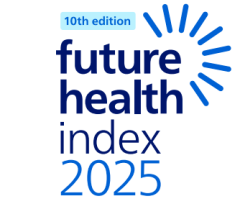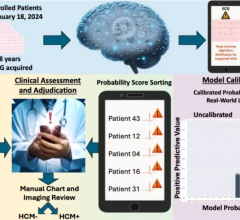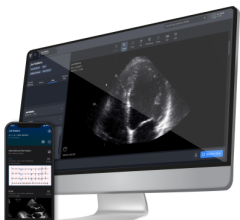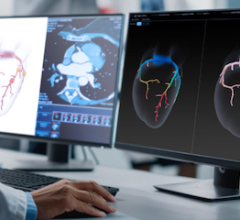
May 17, 2017 — Partners HealthCare and GE Healthcare announced a 10-year collaboration to rapidly develop, validate and strategically integrate deep learning technology across the entire continuum of care. The collaboration will be executed through the newly formed Massachusetts General Hospital and Brigham and Women’s Hospital Center for Clinical Data Science and will feature co-located, multidisciplinary teams with broad access to data, computational infrastructure and clinical expertise.
The initial focus of the relationship will be on the development of applications aimed to improve clinician productivity and patient outcomes in diagnostic imaging. Over time, the groups will create new business models for applying artificial intelligence (AI) to healthcare and develop products for additional medical specialties like molecular pathology, genomics and population health.
“This is an important moment for medicine,” said David Torchiana, M.D., CEO of Partners HealthCare. “Clinicians are inundated with data, and the patient experience suffers from inefficiencies in the healthcare industry. This partnership has the resources and vision to accelerate the development and adoption of deep learning technology and empower clinicians with the tools needed to store, analyze and leverage the flood of information to more rapidly and effectively deliver care.”
The vision for the collaboration is to implement AI into every aspect of a patient journey – from admittance through discharge. Once the deep learning applications are developed and deployed, clinicians and patients will benefit from a variety of tools that span disease areas, diagnostic modalities and treatment strategies and have the potential to do everything from decrease unnecessary biopsies to streamline clinical workflows to increase the amount of time clinicians spend with patients versus performing administrative tasks. Additionally, the teams will co-develop an open platform on which Partners HealthCare, GE Healthcare and third-party developers can rapidly prototype, validate and share the applications with hospitals and clinics around the world.
With the initial diagnostic imaging focus, early applications will address cases like:
- Determining the prognostic impact of stroke,
- Identifying fractures in the emergency room;
- Tracking how tumors grow or shrink after the administration of novel therapies; and
- Indicating the likelihood of cancer on ultrasound.
The applications are being developed based on three criteria:
- Patient impact;
- Technical capability; and
- Market appetite.
This is to ensure that the solutions being developed are not solely dependent on the data that’s available but specifically target the top clinician pain points and the most critically ill patients. The goal is to bring the most promising solutions to market faster, so they can start making an impact for hospitals, health systems and patients globally sooner.
Spinal injury patients represent the types of cases where deep learning applications can help clinicians deliver faster, more efficient care, as the patients need to be treated immediately or run the risk of significant and permanent damage. For a single patient, a lumbar spine magnetic resonance imaging (MRI) exam may generate up to 300 images. In addition, a doctor may need to review prior scans and notes in a patient’s electronic medical record before making a diagnosis. A deep learning application could be leveraged to quickly analyze the data and determine the most critical images for the radiologist to read, shortening the time to treatment for trauma patients, and enabling the clinician to deliver more personalized and comprehensive care for all patients – critically injured or not.
“We’re evolving the healthcare system to be able to take advantage of the benefits of deep learning, bringing together hospitals, data sets and clinical and technical minds unlike ever before,” said Keith Dreyer, DO, Ph.D., chief data science officer, Departments of Radiology at MGH and BWH. “The scope reflects the reality that advancements in clinical data science require substantial commitments of capital, expertise, personnel and cooperation between the system and industry.”
Read the article "How Artificial Intelligence Will Change Medical Imaging."
For more information: www.gehealthcare.com, www.partners.org


 September 24, 2025
September 24, 2025 









